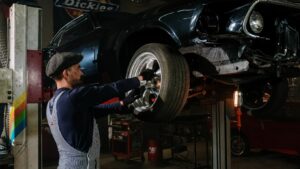In the labyrinth of gears, pistons, and spark plugs that make up the heart of your vehicle, there’s a need for a skilled navigator. Enter the automotive mechanic, the unsung hero of the open road. They’re the experts who keep our wheels turning and our journeys smooth, ensuring that every ride is safe and sound.
From routine maintenance to complex repairs, these professionals have a broad spectrum of responsibilities. They’re not just fixing cars—they’re diagnosing problems, finding solutions, and ultimately, preserving our freedom to travel. With a blend of technical expertise and problem-solving skills, they keep the world moving.
Automotive Mechanic
Continuing from where they left off, the mechanics in the automotive field face an essential role. Their jobs carry a significant weight in the success of our everyday life. Let’s dive into the jobs they undertake daily and the expertise they must command to excel in this occupation.
Key Responsibilities
 Automotive mechanics, known for their expertise, commit to several pivotal tasks every day. Testing vehicle systems and parts, identifying mechanical problems, and executing routine maintenance tasks form the brunt of their work.
Automotive mechanics, known for their expertise, commit to several pivotal tasks every day. Testing vehicle systems and parts, identifying mechanical problems, and executing routine maintenance tasks form the brunt of their work.
They also piece together engines and other parts, a task that requires extensive knowledge and patience. Reparations form a core duty too, with mechanics working on everything from a small faulty wire to larger issues like a car’s transmission system.
Required Skills and Knowledge
To execute their duties efficiently, automotive mechanics possess sharper skills and deep knowledge in various areas. Technical proficiency, for instance, enables them in accurate problem identification and effective repairing. Strong diagnostic skills help mechanics determine the issues quickly, triggering faster resolutions. Physical dexterity is also vital, allowing safe and precise handling of tools and vehicle components. An in-depth understanding of the latest automotive technology equips them to work on modern, sophisticated vehicles.
Tools and Technology in Modern Automotive Repair
Modern automotive repair requires a specific set of tools and the application of innovative technology. This section discusses these essential tools and technological advancements prevalent in the industry.
Essential Tools for Every Mechanic
 Every mechanic understands the imperative requirement for a range of tools. These go beyond spanners, screwdrivers, and jacks, extending to sophisticated equipment like diagnostic code readers and multimeters.
Every mechanic understands the imperative requirement for a range of tools. These go beyond spanners, screwdrivers, and jacks, extending to sophisticated equipment like diagnostic code readers and multimeters.
For instance, pneumatic tools such as impact wrenches and ratchets enable faster work on vehicles, reducing physical strain. On the other hand, a mechanic cannot overlook tools like breaker bars or torque wrenches for disassembling and reassembling components, ensuring secure connections.
Technological Advancements in the Industry
The automotive industry constantly evolves with technology, and the repair sector is no exception. Computerized systems are now a standard part of most vehicles, necessitating mechanics to attain computer literacy and technological competence. For example, On-board Diagnostics (OBD) systems provide immediate access to the engine’s status, reducing diagnostic time and improving problem-solving efficiency.
Simultaneously, Bi-directional control technology allows a mechanic to conduct conclusive tests by controlling vehicle systems or components from a scan tool. Such advancements denote a transition from traditional hands-on repair to a more technologically aligned practice, emphasizing the relevance of continuous learning in the modern automotive repair profession.
Career Pathways for Automotive Mechanics
Mapping career progression within the automotive mechanic industry illuminates varied options for professional growth. The section succinctly explores the gateway of entry-level opportunities, followed by advancements and specializations attainable on the mechanic’s journey.
Entry-Level Opportunities
 Starting out, mechanics often secure positions as trainee or apprentice technicians. Hands-on, supervised experience forms the crux of these opportunities.
Starting out, mechanics often secure positions as trainee or apprentice technicians. Hands-on, supervised experience forms the crux of these opportunities.
By taking on routine tasks – such as oil changes, tire rotations, and brake pad replacements – novice mechanics learn important procedures first-hand.
Advancements and Specializations
As expertise and experience grow, mechanics can advance to more specialized roles. For instance, becoming a Master Technician represents a prestigious career milestone. Achieving this requires passing a series of rigorous exams overseen by an accredited body like the ASE. Specializations, like diesel service or body repair, also exist to further diversify a mechanic’s repertoire. These options not only elevate a mechanic’s skillset, but often correlate to increased earnings and responsibilities.



